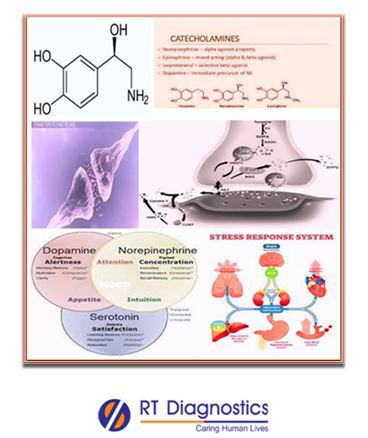CATECHOLAMINES - PLASMA:
Why Plasma Catecholamines Test?
CLINICAL INFORMATION
Test for Catecholamines in plasma helps to determine the levels of catecholamines in the suspected patient’s blood is too high as seen in certain rare tumors like neuroblastoma or pheochromocytoma.
The main catecholamines are dopamine, norepinephrine, and epinephrine (adrenalin). Catecholamines are released into the blood when a person is under physical or emotional stress. Splanchnic nerve stimulation is the physiological stimulus for catecholamine secretion. The stimulation of splanchnic nerves results in the release of ACh from nerve endings in the adrenal medulla. The physiological function of catecholamines is to increase the heart rate, blood pressure, breathing rate, muscle strength, mental alertness and it lowers the amount of blood flow (vasoconstriction) to the skin, intestines, and to the major organs including the brain, heart, and kidneys.
Causes for higher levels of catecholamines other than tumors of the adrenal such as neuroblastoma or pheochromocytoma are physical or mental stress can also constantly increase the levels of catecholamines as seen in conditions such as any major stress, burns, sepsis (whole-body sepsis), illnesses, surgery or traumatic injury, etc. The high surge of catecholamines storm is also reported in cases such as rabies and is responsible for the severe feeling of agitation, terror, and dysautonomia present in the pre-coma stage of the disease.
Classical symptoms of pheochromocytoma (tumors of the adrenal gland) are significant anxiety, depression, and panic. Other manifestations are hyperglycemia, malignant hypertension, sweating, and headache. Urine catecholamines in urine (free catecholamines, vanillylmandelic acid –VMA, or metanephrine are formed by the degradation of catecholamines by the enzyme COMT –Catechol–O –Methyl–Transferase) is measured by the total amount of catecholamines excreted into the urine in 24 hours. The significance of urine catecholamines over blood catecholamines is that the 24-hour urine test detects excess episodic production that might be missed with blood tests taken at any given time (random) hence the possibility of missing out the pathology by probability is high.

General Instructions:
Sample Requirement: Specimen - Blood sample collected from the vein. Test Preparation: None.
NOTE - Sample for specimen collections may vary based on the patient’s condition/cases according to the patient’s presenting complaints/signs or symptoms:
SPECIMEN REQUIREMENT (Special or Rare Cases) - As instructed and guided by Physician / Clinician / Pathologist / as per Laboratory’s requirements, according to procedures and protocols.
Sample Requirement: Blood sample collected from the vein
Test Preparation: Suggestions from your Doctor
This Multi-Specialty Clinical Referral Laboratory RT DIAGNOSTICS provides precise and accurate tests with an extensive range of testing services to the medical centers to help in the diagnosis and identification of pathology in the test specimens for infectious diseases and also to evaluate the function of organ systems of the patient. It prevents further complications and helps to stabilize and restore health to near normalcy at the earliest without delay.



